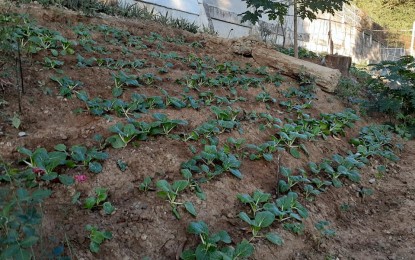
CASH CROPS. Inside the Ilocos Norte Provincial Jail is no idle lot as immediate cash crops like pechay are planted in it. This is where inmates get some of their food supply while selling the surplus to the market as additional source of income. (Photo courtesy of the Ilocos Norte Provincial Jail)
LAOAG CITY—The Ilocos Norte Provincial Jail (INPJ) is providing more opportunities for inmates to change their lives for the better.
While serving their time in jail, at least 40 inmates may now get back to school through the Alternative Learning System courtesy of the Schools Division of Ilocos Norte and the Ilocos Norte Government.
ALS is a parallel learning system in the country established by the Department of Education (DepEd) that provides all Filipinos, regardless of age, the opportunity to have access to and complete basic education.
Provincial Jail Warden Benilda Sadian said in an interview Thursday the selected inmates are now preparing for the ALS entrance examination should they qualify for it.
“Our inmates are happy with this. However, they should pass their entrance test first so they could be included in the final list of qualified ALS takers,” he said.
Aside from ALS, Sadian said the inmates are also trained by the Technical Education Skills and Development Authority (TESDA) in baking, massage and therapy, manufacturing, electronics, automotive, and carpentry, among others.
Last week, at least 50 inmates also took up an Agriculture Crop Production course to enhance their knowledge in organic agriculture and entrepreneurship.
Inside the INPJ compound is a vegetable garden where inmates also plant immediate cash crops such as pechay, native ginger, squash, papaya, taro and bitter gourd, among others.
Sadian said some inmates are also into handicrafts-making, producing lanterns, recycled planters, baskets and other decorative items for sale.
To date, the INPJ is host to 355 inmates and most of them have pending cases related to prohibited drugs.
For the past two consecutive years, the INPJ has been among the Top 10 Most Outstanding Provincial Jails in the country for its best practices in generating livelihood for the inmates and for its reformation programs and other services. (PNA)
